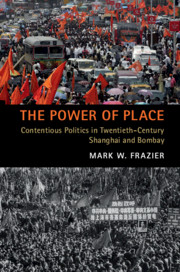Book contents
- The Power of Place
- The Power of Place
- Copyright page
- Contents
- Figures
- Maps
- Tables
- Preface
- Acronyms
- Introduction
- 1 Political Geographies and Contentious Ports
- 2 Nationalism and Urban Social Movements, 1919
- 3 Containing Contention through Nationalist Movements
- 4 The Quest for a Socialist-Modernist Metropolis
- 5 The Rebellions of 1966
- 6 Relocation, Deindustrialization, and the Politics of Compensation in Mumbai
- 7 Relocation, Deindustrialization, and the Politics of Compensation in Shanghai
- Conclusion
- Bibliography
- Index
7 - Relocation, Deindustrialization, and the Politics of Compensation in Shanghai
Published online by Cambridge University Press: 06 May 2019
- The Power of Place
- The Power of Place
- Copyright page
- Contents
- Figures
- Maps
- Tables
- Preface
- Acronyms
- Introduction
- 1 Political Geographies and Contentious Ports
- 2 Nationalism and Urban Social Movements, 1919
- 3 Containing Contention through Nationalist Movements
- 4 The Quest for a Socialist-Modernist Metropolis
- 5 The Rebellions of 1966
- 6 Relocation, Deindustrialization, and the Politics of Compensation in Mumbai
- 7 Relocation, Deindustrialization, and the Politics of Compensation in Shanghai
- Conclusion
- Bibliography
- Index
Summary
- Type
- Chapter
- Information
- The Power of PlaceContentious Politics in Twentieth-Century Shanghai and Bombay, pp. 232 - 260Publisher: Cambridge University PressPrint publication year: 2019



